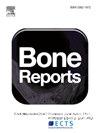柚皮素通过调控 miR-26a/Ski 轴促进骨髓间充质干细胞的成骨潜能
IF 2.6
Q3 ENDOCRINOLOGY & METABOLISM
引用次数: 0
摘要
背景股骨头骨坏死(ONFH)是一种常见的骨科疾病,严重影响患者的生活质量。柚皮素对股骨头坏死有保护作用。本研究旨在探讨柚皮素调控miR-26a在股骨头坏死中的作用机制。方法从GEO数据库获取两个与股骨头坏死相关的测序数据集(微RNA数据集GSE89587,mRNA数据集GSE123568)进行生物信息学分析。骨髓间充质干细胞(BMSCs)经成脂培养基(AM)或成骨培养基(OM)处理,然后用 10 μM、100 μM 或 1000 μM 柚皮甙处理。通过 RT-qPCR 和 Western 印迹检测基因和蛋白质水平。ALP 活性和茜素红染色(ARS)用于研究 BMSCs 的成骨分化。油红 O 染色用于检测成脂分化。用甘油三酯检测试剂盒检测 BMSCs 中甘油三酯(TG)的含量。结果生物信息学分析表明,在ONFH患者的外周血中,miR-26a显著下调,Ski显著上调。柚皮苷能明显促进成骨分化,提高 ALP 活性和 ARS。同时,柚皮苷能减少脂肪分化并抑制 TG 水平。此外,在AM处理的BMSCs中,miR-26a下调,Ski增加;而在OM处理的BMSCs中,miR-26a上调,Ski减少。此外,miR-26a 促进了 BMSCs 的成骨分化,抑制了成脂分化。结论柚皮素可通过调控 miR-26a/Ski 轴促进 BMSCs 的成骨分化。因此,柚皮苷可能是一种治疗ONFH的新药物。本文章由计算机程序翻译,如有差异,请以英文原文为准。
Naringin promotes osteogenic potential in bone marrow-derived mesenchymal stem cells via mediation of miR-26a/Ski axis
Background
Osteonecrosis of the femoral head (ONFH) is a common orthopedic disease, which seriously affects the quality of life of patients. Naringin has protective effect on ONFH. In present study, we aimed to investigate the mechanism of Naringin regulating miR-26a in ONFH.
Methods
Two sequencing datasets (GSE89587 for micro-RNA, GSE123568 for mRNA) related to ONFH were obtained from the GEO database for bioinformatics analysis. Bone marrow-derived mesenchymal stem cells (BMSCs) were treated with adipogenic medium (AM) or osteogenic medium (OM), and then treated with 10 μM, 100 μM or 1000 μM Naringin. Gene and protein levels were detected by RT-qPCR and Western blotting. ALP activity and alizarin red staining (ARS) were applied to investigate the osteogenic differentiation of BMSCs. Oil red O staining was performed to test adipogenic differentiation. The content of triglycerides (TG) in BMSCs was detected by TG detection kit. Double luciferase reporter gene measured the interaction between miR-26a and Ski.
Results
Bioinfomatic analyses indicated a significant downregulation of miR-26a and a significant upregulation of Ski in the peripheral blood of patients with ONFH. Naringin significantly promoted the osteogenic differentiation, and increased the ALP activity and ARS. Meanwhile, it decreased the adipogenic differentiation and inhibited TG levels. In addition, miR-26a was downregulated and Ski was increased in AM-treated BMSCs, while miR-26a was upregulated and Ski was decreased in OM-treated BMSCs. Furthermore, miR-26a promoted the osteogenic differentiation and suppressed the adipogenic differentiation in BMSCs. Moreover, Naringin enhanced osteogenic potential in BMSCs was reversed by knockdown of miR-26a or overexpression of Ski.
Conclusion
Naringin could promote osteogenic differentiation of BMSCs via mediation of miR-26a/Ski axis. Thereby, Naringin might be a new agent for ONFH treatment.
求助全文
通过发布文献求助,成功后即可免费获取论文全文。
去求助
来源期刊

Bone Reports
Medicine-Orthopedics and Sports Medicine
CiteScore
4.30
自引率
4.00%
发文量
444
审稿时长
57 days
期刊介绍:
Bone Reports is an interdisciplinary forum for the rapid publication of Original Research Articles and Case Reports across basic, translational and clinical aspects of bone and mineral metabolism. The journal publishes papers that are scientifically sound, with the peer review process focused principally on verifying sound methodologies, and correct data analysis and interpretation. We welcome studies either replicating or failing to replicate a previous study, and null findings. We fulfil a critical and current need to enhance research by publishing reproducibility studies and null findings.
 求助内容:
求助内容: 应助结果提醒方式:
应助结果提醒方式:


